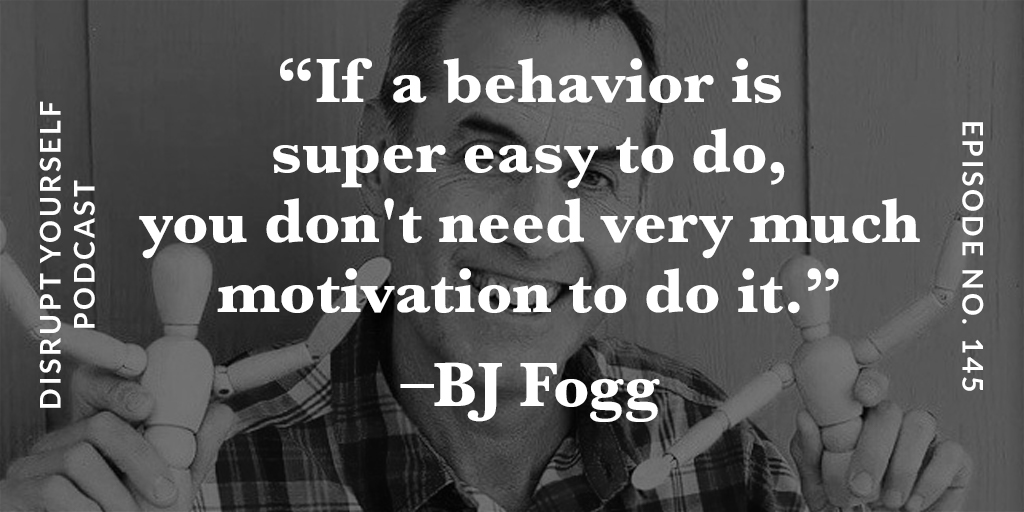Our guest on the podcast today is BJ Fogg, world-renowned behavioral scientist and the founder of Stanford’s behavior design lab. BJ’s new book, Tiny Habits: The Small Changes That Change Everything, he examines the fundamentals of what it takes to modify our habits and lays out a framework for individuals to make small adjustments that lead to lasting change.
Many authors once dreamed of writing a book, but BJ can state unequivocally that this book exists because of a dream. When he began teaching the concepts of Tiny Habits as far back as 2011, he was frequently asked when the book would come out—but unfortunately for his students, BJ wasn’t writing a book. He didn’t have the time. However, his priorities changed when he had a terrifying dream where he was about to die in a plane crash. The thought that remained with him long after that night was his gut reaction of deep, deep regret that he had never shared his work in a way that would help people outside of his classroom. BJ had long had the technical ability to write a book, and he was constantly being prompted to write the book, but now, the final piece of the equation slipped into place: BJ had motivation.
“Behavior happens when three things come together at the same moment: Motivation, Ability and Prompt. If any one of those three components is missing, then the behavior won’t happen.”
This equation is the backbone of the Tiny Habits framework, and while it seems simple it is amazingly effective. BJ suggests focusing on forming habits around things we want to do, rather than things we feel we should do, because “shoulds” do not create true motivation within us.
“We have plenty of “wants” that are good and beneficial that we haven’t put into practice yet…[W]hat you don’t do is pick a behavior that feels like a “should” and then try to motivate yourself to do it. That’s a dead-end path. Instead, first and foremost, you pick the things that you already want to do.
If you’re trying to figure out why you’re struggling to form a new habit, you can also examine this formula to troubleshoot what is holding you back. Surprisingly, lack of motivation is not the most likely culprit when we fail at maintaining an exercise goal or attempt to change our eating habits. Often, it is a prompt that is missing, reminding us to do what we set out to do, or our ability is lacking because the goal isn’t easy enough to execute.

There are many other pearls of wisdom sprinkled throughout our conversation, and I’m excited to share it with you. If you enjoy what you hear I hope you feel motivated to pay it forward and share the episode with someone you know.
“If a behavior is super easy to do, you don’t need very much motivation to do it.”
Listen to the episode in the player above, or download and enjoy it on Apple Podcasts. If you’re so inclined, please leave us a review!
Takeaways from this episode:
- From an early age, BJ has felt that he was put on this planet to serve and help others. This fuels his desire to help people become who they want to be through changing their behavior.
- “Outcomes and aspirations are not behaviors.”
- The formula for changing habits: Behavior = M A P
Behavior happens when Motivation, Ability, and Prompt come together at the same moment.- When looking to create a habit, focus on your “wants” rather than your “shoulds.” Pick behaviors that align with aspirations that you already want, not behaviors you think you should do.
- Remember, there are hundreds of ways to fulfill aspirations. If you desire to be more physically active, you don’t have to go to the gym or climb a stair climber. You can go on hikes (because you love being outdoors), or go surfing (because you want to spend more time at the beach).
- Pick behaviors you can do (ability). Take the habit you want and make it super, super small. If it’s easy to do you won’t need very much motivation to do it.
- The Prompt is the thing that says “do this now.” If you don’t have a prompt, you don’t have behavior.
- Golden Behaviors: Things that are effective, something that you want to do, and easy to do. This are most easily turned into habits.
- If you’re experiencing problems with changing a habit, troubleshoot by starting with the prompt first, not motivation. If a prompt exists, then examine your ability to do the behavior (Is it easy? Can I make it easier?). Check your motivation last.
- Pearl Habits help you take something that happens in your life that you find annoying or irritating and turn it into something positive. For example, if your neighbor’s dog barks at night, you can use the barking as a prompt to think of something you are grateful for.
Links Mentioned in this Episode:
- BJ Fogg – Website | Twitter | LinkedIn
- Tiny Habits: The Small Changes That Change Everything by BJ Fogg
- The 4-Hour Workweek: Escape 9-5, Live Anywhere, and Join the New Rich by Timothy Ferriss
- Tiny Habits Website
- Fogg Behavior Model
- Free Tiny Habits 5 Day Program
- Become the Reviewer of the Week – Leave a 5 Star Rating and Review on Apple Podcasts

BJ Surfing in Maui

